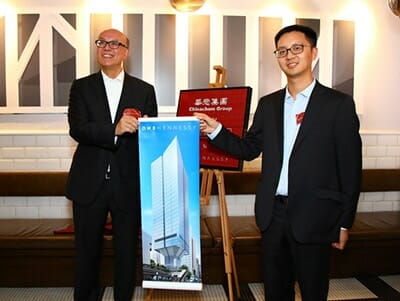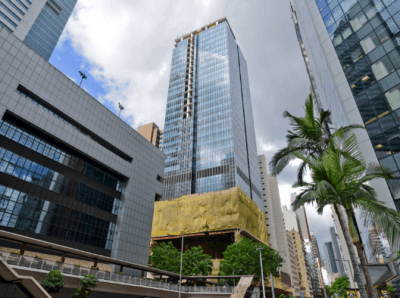
Chinachem’s Choi and Kr Space co-founder Liu Chengcheng enjoyed some good times, but their relationship just didn’t last
Hong Kong-listed Chinachem is suing Kr Space for HK$500 million ($63.8 million) accusing the mainland co-working space provider of breaking a five-year lease contract, according to a writ filed by the property developer with Hong Kong’s High Court.
Kr Space, a spinoff of Alibaba-backed technology platform 36Kr, surrendered an 83,000 square foot (7,712 square meter) lease in the One Hennessy Office building in Hong Kong’s Wanchai district, Mingtiandi reported last week.
Chinachem, owner of the 21-story tower on Hennessy Road, is now claiming the HK$500.9 million sum from Kr Space as the total value of the co-working provider’s lease for the seven floors space in the newly completed tower.
A Contract That Wasn’t to Be
The compensation Chinachem is seeking includes 10 years’ rent at HK$7.4 million a month, plus management and facilities fees, as well as government taxes, reported the South China Morning Post.
Kr Space and Chinachem had apparently agreed to a five year lease for floors 11 through 19 of the building in May of last year, with an option to renew for another five years. With the project not yet having secured its occupancy permit from the government at the time, most would-be occupiers would sign a letter of intent with the landlord for the space, with a formal lease to be conditional on the building receiving its occupancy permit, which Chinachem achieved for One Hennessy in March of this year.
As a redevelopment project kicked off by Chinachem in 2013, One Hennessy is set for completion by Q2 2019.
Collecting Alimony for Being Jilted at the Altar
Chinachem had initially asked Kr Space, which was planning to use One Hennessy as its flagship location in Hong Kong, to pay a security deposit of HK$24.3 million – equivalent to three months’ rent along with management and air-con charges, as well as a decoration deposit of HK$415,000. However, after some negotiation, the flexible office firm ended up paying an initial deposit of only HK$7.4 million for what would have been its first location outside of mainland China.
“We are disappointed for sure, when such a situation happens to any of our tenants,” Donald Choi, Chinachem’s chief executive, told the SCMP. He confirmed that the company received emails on March 4 and 11 saying Kr Space would not go ahead with a five-year lease starting April 1, as stated in an intent agreement the two sides signed on April 30 last year.
Although the two parities did not sign a final leasing contract for the property and the developer now contends that Kr Space had accepted the lease terms and that the contract should be considered legally binding and enforceable, according to the writ.
Co-Working Bros Go with No Harm No Foul

Kr Space, which is reported to be down-sizing amid a drought of venture capital financing, said it was unaware of the legal action and had not been contacted by Chinachem. The company also confirmed it would not take up space in One Hennessy, according to the SCMP.
Sean Qian Xiao, vice-president at Kr Space, told the newspaper that, based on their understanding, if they terminated the agreement, the deposit they have paid will be forfeited, but countered that the compensation Chinachem is asking for was unrealistic and too high.
Qian also added that a Kr Space co-working space in Hong Kong’s Time Square, which was previously thought to have too been aborted by the company, has signed tenants and will open this month as scheduled. The two-story location is, however, much smaller than the planned three-story, 53,000 square foot space which the company had announced in August last year.
No VC Funding Means No More Business
The change in Kr Space’s plans may be due to a major funding round which never happened. The startup, which reached a total of just over $137 million in funding when it won RMB 600 million in investment from existing backers in January 2018, had in May last year announced plans to raise an additional $200 million at a valuation of over $1 billion.
However, the company appears never to have closed on that unicorn round even after having opened more than 60 co-working centres spanning more than 300,000 square meters of space in 12 Chinese cities.
The challenges afflicting Kr Space may be an industry-wide phenomena in China, according to a survey released earlier this year.
Forty companies in China’s shared-office sector vanished in the 10 months from January to October 2018, according to a report by the China Real Estate Chamber of Commerce, with the research by the real estate non-profit finding that about 40 percent of existing co-working projects are more than half empty.
Leave a Reply